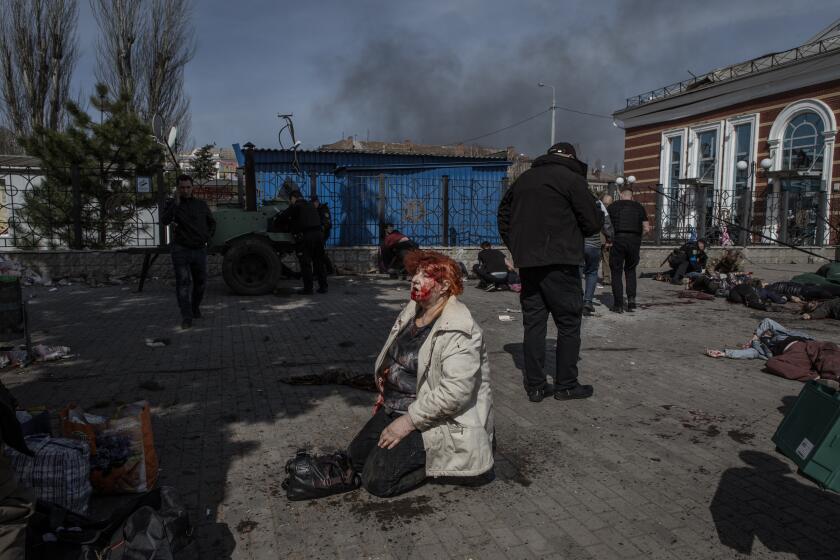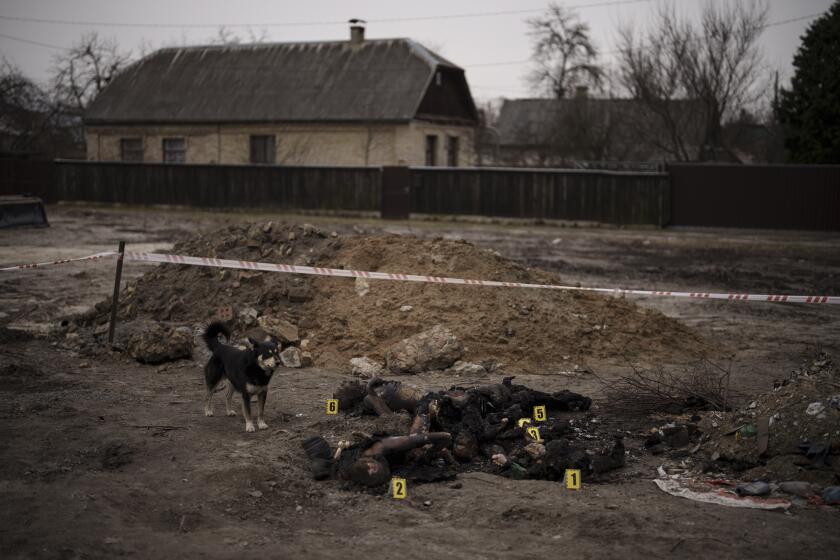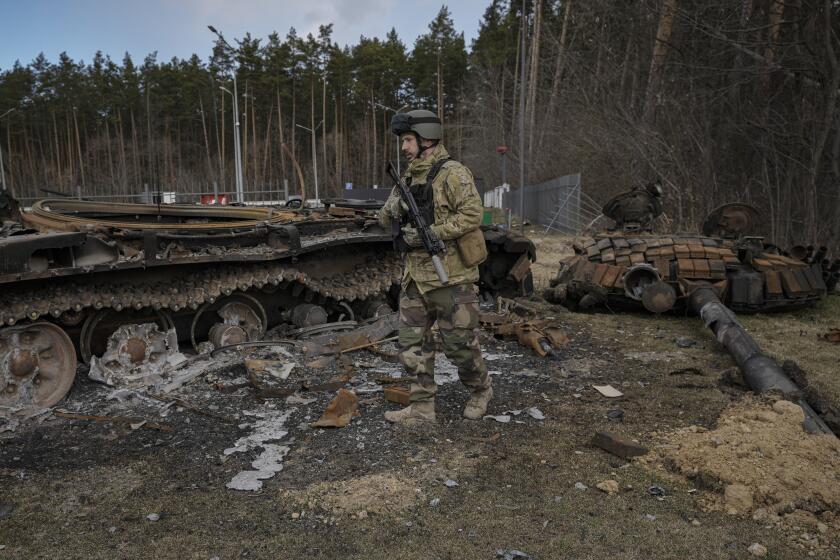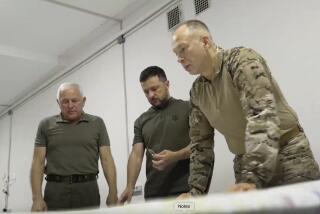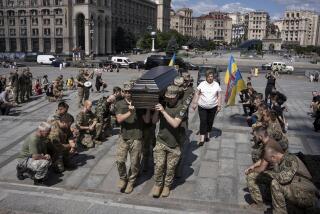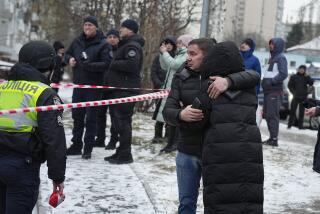At least 52 civilians killed in Russian strike on train station, Ukraine says

Civilians are killed and dozens more wounded in a strike in eastern Ukraine, where Russia is now concentrating its forces.
KYIV, Ukraine — Dozens of civilians trying to escape eastern Ukraine were killed Friday in a Russian missile strike on a crowded train station, according to Ukrainian officials, who warned that they expected to uncover more evidence of war crimes in parts of the country previously controlled by Russian troops.
Ukraine said a railway station in the city of Kramatorsk where thousands of people had gathered to try to escape the war-torn east was hit by a Russian rocket Friday morning. At least 52 people were killed — including several children — and about 100 others were injured, officials said.
Photos posted on Telegram by Ukrainian President Volodymyr Zelensky showed bodies strewn across the train platform alongside suitcases, stuffed animals and a baby carriage.
In recent days, officials had been urging civilians to flee Kramatorsk and other parts of eastern Ukraine, where Russia has begun regrouping its forces after they failed to conquer the capital, Kyiv.
The Kremlin denied responsibility for Friday’s attack, but as its troops prepare to try to win more territory in an area already
partially controlled by Moscow-backed separatists,
the strike on the train station stirred fears that more brutal tactics lie ahead in a likely war of attrition.
At least 52 civilians were killed and dozens of others wounded Friday in a Russian missile strike on a train station packed with evacuees.
“The inhuman Russians are not changing their methods. Without the strength or courage to stand up to us on the battlefield, they are cynically destroying the civilian population,” Zelensky said. “This is an evil without limits.”
NATO Secretary General Jens Stoltenberg told National Public Radio that “the scale and the scope” of the war’s next phase in the east may be the worst yet and predicted more civilian causalities. He said he believes Russia still wants full control of Ukraine and warned that the conflict could last “months and even years.”
The attack on the train station triggered a new wave of international outrage, with British Defense Secretary Ben Wallace calling it an evident war crime: “These were precision missiles aimed at people trying to seek humanitarian shelter.”
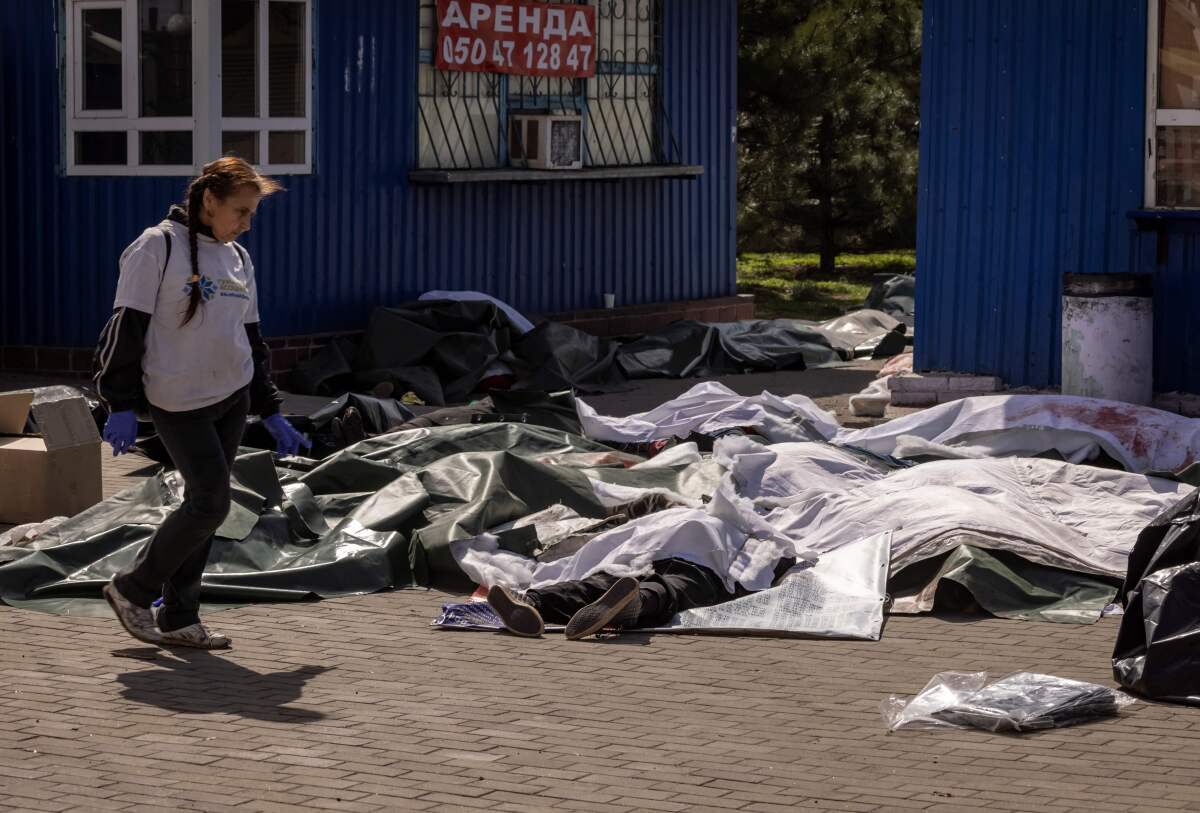
It also sparked calls for additional economic penalties on Russia, which was targeted with new sanctions this week in response to mounting evidence that its troops committed atrocities against Ukrainian civilians in Bucha and other suburbs of Kyiv.
The European Union on Friday formally adopted regulations that by midsummer will ban the import of coal, wood and chemicals from Moscow — a move expected to reduce the EU’s total imports from Russia by a tenth.
But Western governments, which have already targeted Russia’s financial institutions, its central bank and its wealthiest citizens, are beginning to run out of ways to punish Russia. And as long as they continue to refuse to impose a no-fly zone over Ukraine or otherwise be drawn into a wider war against Russia, their options in responding to attacks on civilians are dwindling.
Ukrainian officials say grim scenes like those in Bucha, where some 400 people were killed, many of them shot execution-style with their hands bound, have been be repeated in other parts of the country.
In Borodyanka, about 20 miles from Bucha, “it is much more horrible,” Zelensky said. Authorities continued digging Friday through the rubble of a number of apartment buildings in the town, where they say as many as 200 residents may be buried.
Russian forces retreat from the city in Ukraine, leaving behind corpses and live mines.
Zelensky said that any investigation in the southern port city of Mariupol would show more of “the same cruelty, the same terrible crimes” by Russian troops as had been unearthed elsewhere.
Mariupol, whose residents have endured weeks of intense bombardment and deprivation of food, water and medicine, is of strategic importance to Russia, which wants to use it to block Ukraine’s access to the Sea of Azov and to establish a land corridor to Crimea, the peninsula Moscow illegally annexed in 2014.
In an interview with Britain’s Sky News, a Kremlin spokesman vowed that a siege on Mariupol would continue.
“Mariupol is going to be liberated from nationalistic battalions, and we hope it will happen sooner [rather] than later,” spokesman Dmitry Peskov said, alluding to Moscow’s unsubstantiated contention that Ukrainian fascists are oppressing Russian speakers in eastern and southern Ukraine.
In a surprising acknowledgment of the war’s toll on Russia, he admitted that his country had suffered substantial troop losses. The official Russian military death toll is about 1,300, although Western estimates put the figure at several times that.
“Yes, we have significant losses of troops, and it’s a huge tragedy for us,” Peskov said without specifying a number.
He also suggested that the fighting in Ukraine could wrap up “in the foreseeable future,” either through achievement of Moscow’s battlefield goals or through negotiations with Kyiv. But Western and Ukrainian officials doubt Russian President Vladimir Putin is willing to wind down what he refers to as his “special military operation.” Multiple rounds of peace talks have so far produced no tangible results.
U.N. votes to suspend Russia from its Human Rights Council and the European Union bans Russian coal as Ukraine’s leader calls for more military aid.
Ukraine’s prosecutor general’s office announced Friday that it had logged 5,149 “crimes of aggression and war crimes” by Russian troops. The German newsweekly Der Spiegel reported that Berlin’s foreign intelligence agency had intercepted radio exchanges between Russian soldiers casually discussing the killing of civilians.
Despite the growing dossier of independently collected evidence, Peskov repeated Russia’s denials of any massacres by its forces, calling the images of bodies lying in Bucha’s streets “a bald fake.”
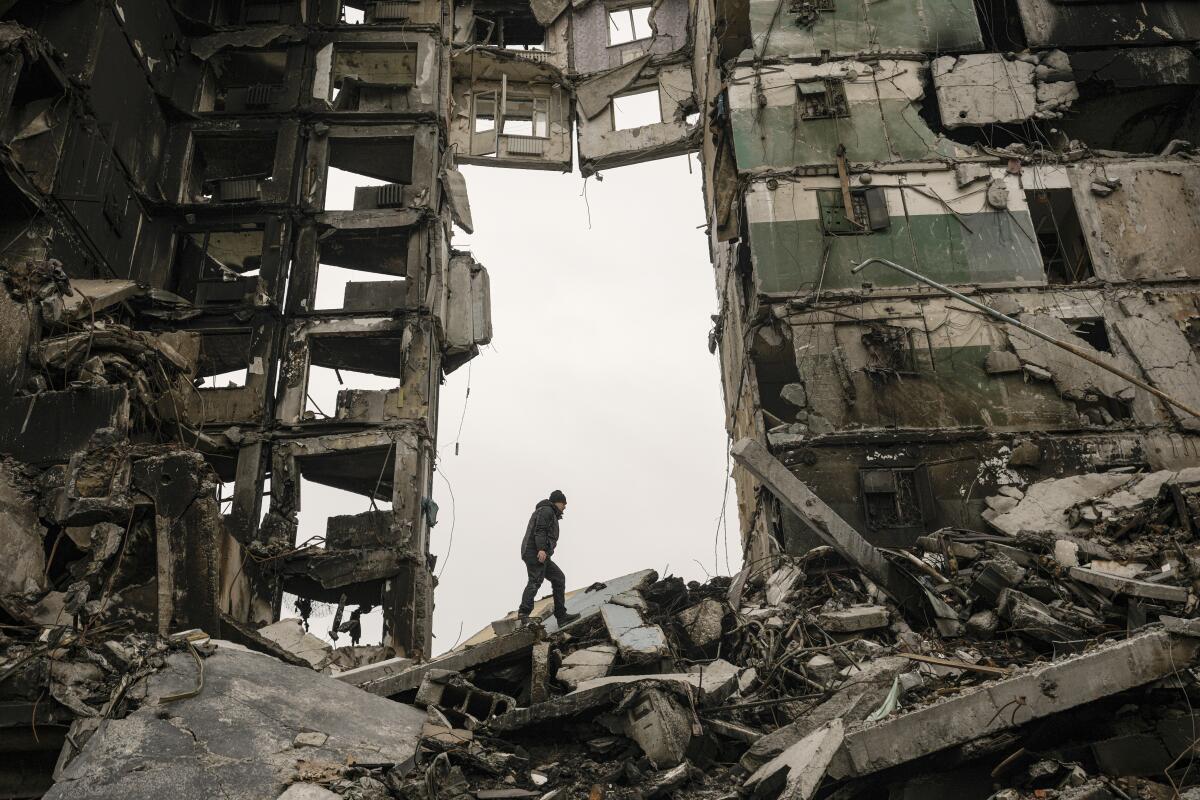
In a clear attempt to try to dispel Russian propaganda, the president of the European Commission, Ursula von der Leyen, visited Bucha on Friday, where she appeared visibly shaken by the sight of bodies lined up and wrapped in black plastic bags.
As cold rain poured down in Bucha, workers continued excavating bodies from the muddy grounds outside the golden-domed church of St. Andrew. Authorities suspect that scores of victims killed by the Russians are buried in an unmarked mass grave behind the church.
A crane hoisted the remains from a deep ditch. Forensic investigators in hazardous-materials suits then placed the cadavers in black body bags. By mid-afternoon Friday, about two dozen body bags were laid out on the ground.
The site, adjacent to the regular church cemetery, is the largest of a number of irregular graves found in Bucha since the Russians pulled out, including shallow pits gouged in yards and lots, sometimes containing only a single body.
During the monthlong Russian occupation, officials said, residents turned to makeshift burial places because they could not organize traditional burials or access the town cemetery.
“The unthinkable has happened here,” Von der Leyen said. “We have seen the cruel face of Putin’s army. We have seen the recklessness and the coldheartedness with which they have been occupying the city.”
She and the European Union’s foreign policy chief, Josep Borrell, also met with Zelensky in Kyiv on Friday, part of a wave of diplomats and other international officials who have begun returning to the now-peaceful capital after Russia’s retreat. The EU, Lithuania and Turkey have all returned their ambassadors to Kyiv.
Tens of thousands of Russians want no part of Putin’s war. But forging a new life in exile isn’t easy.
Although Kyiv is a wraith of the bustling urban center it once was, and checkpoints still dot the streets to try to keep out suspected saboteurs, a sense of collective relief seems palpable now that Russian forces have quit the area. People were out Friday strolling through the city’s wooded parks, little heed was paid to the occasional air-raid siren, and liquor sales were permitted again, the fast-emptying shelves attesting to considerable demand. A 9 p.m. curfew remains in place.
Some residents have been returning, but authorities are urging residents of hard-hit northern suburbs — such as Irpin, Bucha and Borodyanka — to stay away until mines, munitions and other hazards are cleared from the streets.
McDonnell reported from Kyiv, Chu from London and Linthicum from Mexico City.
More to Read
Sign up for Essential California
The most important California stories and recommendations in your inbox every morning.
You may occasionally receive promotional content from the Los Angeles Times.
